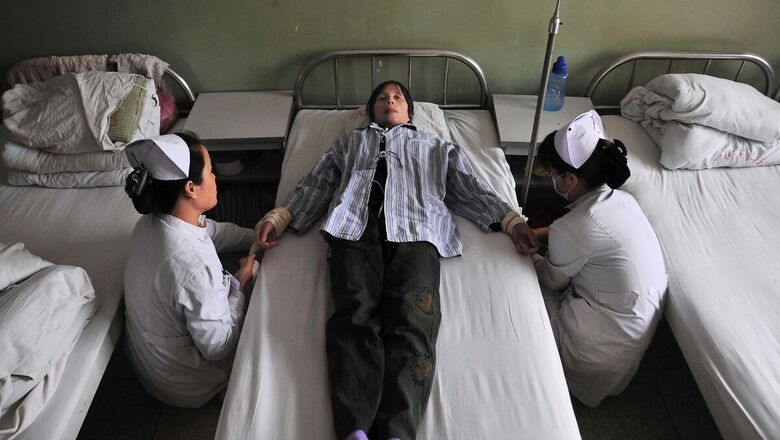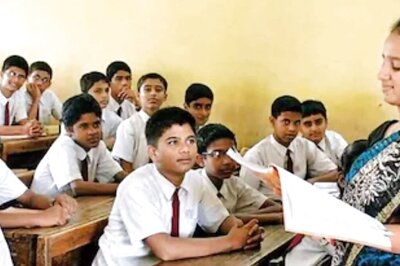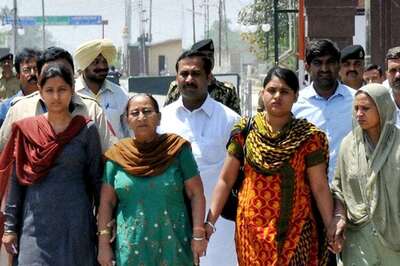
views
What does one feel when one sees a man or a woman in haggard clothes talking to self, making gestures in the air and laughing to oneself on the streets? Most of the time, we just walk away after a cursory glance and do nothing. We are largely ashamed, indifferent and scared to even think of why he/she may be in such a state. He/she can be one of our friends/relatives or loved ones too. Remember 1/7 Indians are mentally ill today, i.e. 20 crore of us are suffering from mental illness.
Such unfortunate human beings are most of the time mentally ill, who have left their original homes and landed up in the streets, in different parts of the country. Many such mentally ill destitute land in mental hospitals all over India and languish there throughout their lives even after recovery, without their human rights addressed, especially their emotional rights. The suicide of a celebrity occupies more space in the daily narratives but the slow demise of the soul, heart and body of these destitute mentally ill in government institutions remains invisible. Remember they were not born on the roads, but gravitate there on account of their illness.
Reuniting them with their families can never be an administrative transaction alone armed with bureaucratic rules, protocols and government diktats. “It requires a heart that is equipped with the software of perseverance, persistence, patience and a belief that such recovered patients have emotional rights to be reunited and rehabilitated with their loved ones,” says Dr Bharat Vatwani, who so far, has united more than 11,000 such patients after recovery through his Shraddha Rehabilitation Centre in more than one and half decade. He was also awarded the Ramon Magsaysay award in 2018 for his work with mentally ill street people.
Following are a few strategies that mental hospitals can follow to help such people-
Rapport, Recovery and Residential Address
Parvati (name changed) living in North India fell mentally ill after her third child, 28 years ago. She was treated locally for some time and after a few years, she left her home in a miserable state. She reached a mental hospital in Maharashtra and was languishing there for 17 years. Her husband had passed away 14 years back.
After she was reunited, Laxmipriya, the counsellor from the Shraddha Foundation, shared, “During Parvati’s counselling, with great difficulty, she remembered her daughter-in-law’s address and by slowly prodding her, different addresses propped up. After many rounds and meeting many people across many towns, we tracked her aunt. Parvati’s mother came there and cried bitterly along with Parvati’s kids. I have never seen such an emotional reunion in my five years of career in Shraddha. I will never forget all the blessings. This was my most precious experience ever.”
She was reunited on March 11, 2023. The staff of mental hospitals need to adopt such a commitment. Training needs to focus on the emotional software of counsellors in such institutes. In my opinion, NGOs should not substitute the work of the government. Putting checks and balances along with human rights protocols are important and mental hospitals need to be made accountable. Cultural literacy and deep commitment need to be inculcated in the echelons of government institutions.
Eternal Vigilance is the price of Liberty
This story I am narrating is true. In the economic capital of India, a woman spent 12 long years of her life in the confines of a mental hospital (2009 – 2021). And what was her fault? Nothing. She was discharged by the medical superintendent of the mental hospital on April 9, 2014, but her husband refused to accept her and sent her back. She languished there till 2021 till the Family Court of Bandra took notice of it. “The husband had put forth lame excuses of his son’s education and comfort of his old and aged father for not allowing the wife to enter the matrimonial home,” the learned Judge Swati Chauhan observed. The story goes back to 1993 when she married her husband. They had a son in 1997. The husband admitted his wife in a mental hospital through a reception order by a Metropolitan Magistrate in 2009. The court observes here that, “this is a classic example of how a reception order of the court was misused to literally drive out a legally wedded wife from the matrimonial home and thereafter restrict her re-entry.” She was sent to a mental hospital for psychiatric treatment. Meanwhile, the husband filed for a divorce on the grounds of cruelty and unsoundness of mind in 2012. She was never released from the hospital and the worst part was, her husband and her son who attained majority, never cared to visit her. Her father passed away and her brother showed no interest, and not a single soul checked on her well-being. The husband continued pursuing the divorce case simultaneously. After being examined by two experts, the Family Court Judge counselled the couple and they are now reunited. The lady had recovered long back but the emotional software required by the mental health hospital staff was missing, as routine cold bureaucratic procedures to get her emotional rights addressed, failed.
Prevailing Mental Health Myths
Many in government institutions believe that recovered patients may not be accepted by relatives but mostly, this is a myth. There has been a move to start rehabilitation centres in different states to house those whose relatives cannot be traced. These will again become the prototype of the earlier mental hospitals. Though I agree that a few will never be able to leave the hospitals, but by effort, a large majority can be rehabilitated. The lack of awareness of modern treatment methods compounds this problem. One strategy that Shraddha Foundation has frequently used is to surprise the family by getting their loved ones to their home after a reasonable recovery. This has worked in a majority of cases.
Recently, in a conversation, Dr Vatwani remarked, “Recently in decades, god knows how many governments must have changed in Maharashtra and in India, how many health ministers, bureaucrats handling the State mental health, superintendents, psychiatrists and social workers must have got changed. But the absolute tragedy is that patients remain where they are. For many solid years of their lives, they are stagnant, stuck, and institutionalised. But the most important takeaway from this particular case that Laxmipriya rehabilitated and reunited is that these patients are alive and have emotions. And their relatives also have emotions. And it is up to you, me, all of us, to bring about closure to these emotions and do good for them. Give them a chance to live a free life. Give them justice.”
Dr Harish Shetty is a psychiatrist at Dr L.H. Hiranandani Hospital. The views expressed in this article are those of the author and do not represent the stand of this publication.
Read all the Latest Opinions here




















Comments
0 comment